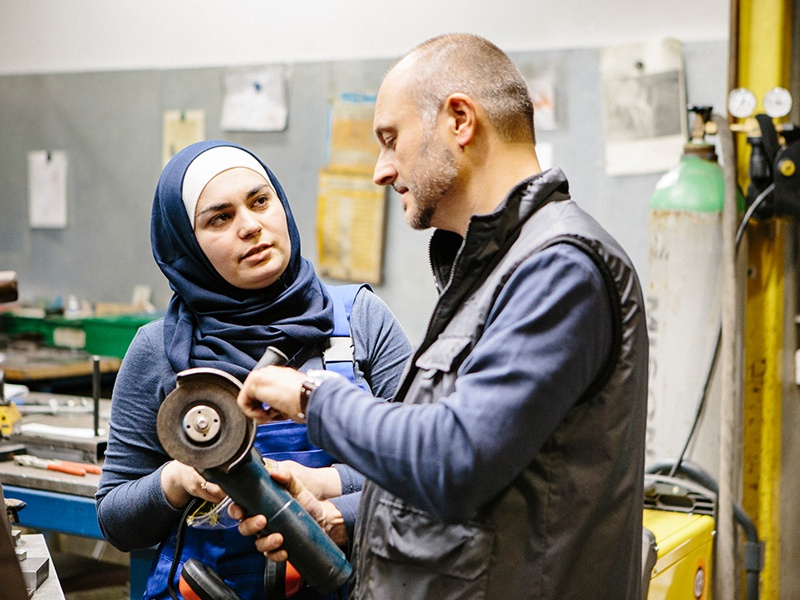Careers Explorer:
What is an apprenticeship?
An apprenticeship is a job with training, and is open to anyone who is 16 and over. There’s no upper age limit. You’ll work alongside experienced staff and gain job-specific qualifications. Your employer will give you tasks to perform, and the training provider will give you the theoretical skills to perform those tasks.
Apprenticeships mean you are employed and will earn while you learn, so you can gain an industry specific qualification without needing a student loan. You’re employed full-time (usually between 30-40 hours per week), which includes the time spent with your training provider.
An intermediate apprenticeship (level 2) usually takes 2 years to complete; however there are different levels of apprenticeships. So, the length of your course will depend on your existing experience, qualifications and your choice of job role.
The different levels of apprenticeships mean that you can enter at a level which is right for you. To progress in your career, you can choose to move onto the next level of an apprenticeship, which are:
- Intermediate level 2 – the equivalent of 5 GCSE passes at grade 9-4 (A*-C)
- Advanced level 3 – the equivalent of 2 A-level passes, Level 3 Diploma or International Baccalaureate
- Higher levels 4, 5, 6 and 7 – the equivalent of a Foundation Degree and above
- Degree level 6 and 7 – the equivalent of a Bachelor’s or Master’s degree
Each apprenticeship will have different entry requirements depending on your chosen role and level. Advertised vacancies will state what these requirements are. Employers will also take into consideration previous work experience, your enthusiasm and talent for the role.




Nearly three-quarters of apprentices agreed that their chances of earning a higher wage in the future had increased.
How do I find an employer?
Starting an apprenticeship is even easier if you have an employer who wants to take you on. This could be a small or large business, a local firm, a family member or a self-employed person.
If you haven’t got an employer yet, don’t worry. There are lots of ways to find someone who wants to hire you as an apprentice:
- Apply for apprenticeships in England through the apprenticeships live feed or search and apply to apprenticeships in Scotland or England through the links on this page.
- Register and upload your CV to job sites such as Indeed or Totaljobs, where you’ll also be able to set up job alerts that get sent to your email, and employers can also contact you directly.
- Go direct to companies and check the apprenticeships/vacancies section on their website and follow their social media channels.
- Contact your local college, specialist provider or apprenticeship managing agency to register your interest and they may be able to help you find an employer.
- Ask your friends, family or neighbours to see if they have any apprenticeships where they work.
- When speaking to employers, let them know that, depending on their circumstances, they could receive up to £12,000 in grants from the government or Construction Industry Training Board (CITB) for taking you on. This will help them to meet the costs of employing you.
Apprenticeship
- Length of study depends on the level of apprenticeship so will be from 1 – 5 years, usually at a local training provider
- They focus on a specific job role, where you’ll learn the skills required
- There are approximately 100 roles in the construction and built environment sector which can be accessed through apprenticeships – with more being added
- As an apprentice you’ll earn as you learn, so there are no tuition fees and you’re paid a wage throughout the course
University
- Full-time university degrees last 3-4 years, usually away from home
- Courses focus on individual, academic study
- There are thousands of courses on offer – some specific like Architecture, and some more general like Business Studies
- Most construction related degrees will give you the opportunity to do a one-year placement in industry
- You’ll need to pay tuition fees (up to £9,000 per year in Wales and up to £9,520 per year for the rest of the UK*)
- Whether you take the apprenticeship route to get a degree or go to university, your qualification will have the same value.
- Further information on apprenticeships and higher and degree apprenticeships can be found at Gov.uk.
Careers Quiz
Still not sure on what you would like to do?
In just a few clicks, discover which career paths will best suit your skills and preferences.

Onsite Construction
Find out more about Tyler and his apprenticeship with Premier Projects Services




